As the 20th Internet Governance Forum gets under way in Lillestrøm, Norway, the RIPE NCC team keeps track of the topics under discussion, with this year's theme being Building Digital Governance Together. Stay tuned for updates through the event!
This 20th edition of the Internet Governance Forum (IGF) takes place in Lillestrøm, Norway against the backdrop of discussions on whether to renew the mandate of the IGF along with the twenty-year review of the World Summit on the Information Society (WSIS+20) taking place at the United Nations General Assembly later this year. The theme for this year’s IGF is Building Digital Governance Together’ and features over 150 sessions in four main themes:
- Digital Trust and Resilience
- Sustainable and Responsible Innovation
- Universal Access and Digital Rights
- Digital Cooperation
Day 4 - Friday, 27 June
Launch of the Post Quantum Cryptography Report
If you thought quantum cryptography is something from the future, think again, warned Elif Kiesow-Cortez. IS3C and AFNIC together launched a report on post-quantum encryption which covers how organisations need to transition their security mechanisms to become quantum resilient. The speakers highlighted the risks of “harvest now, decrypt later” scenarios, in which malicious actors could obtain a lot of data that is encrypted according to our current standards and wait until quantum computing develops enough to decrypt the harvested data. Government systems are particularly at risk since they contain large volumes of data.
Of more specific interest to the RIPE community perhaps is the information on the US and EU approaches to post-quantum cryptography (PQC). The EU has started a migration plan - they hope to encourage transition planning and migration to PQC by the end of 2026 and have this in place by 2030. They might also consider updating GDPR to include quantum-resistant infrastructure as a data-protection requirement. The panellists also pointed out the slow rate of adoption of DNSSEC and IPv6, highlighting that there is considerably greater urgency in this case.
Wrap Up and High Level Messages
The last day of the 20th but hopefully not the last IGF also heard several voices speak up in favour of continuing the multistakeholder approach to Internet and now digital governance issues. They reiterated the need to give the IGF a permanent mandate and greater support to regional and national Internet governance initiatives. As the sessions around the WSIS+20 review continue this year, we will continue to follow these discussions.
Maria Ressa is a familiar face at the IGF, being a part of the Leadership Panel along with Vint Cerf. As she said earlier in the week and reiterated on the last day “The battle for truth is the battle of our generation. With technology as the accelerant, a lie told a million times becomes a fact. Without facts, we don’t have truth. Without truth, there is no trust.”
Her message throughout the week has been strong - that technology whether it is social media or the Internet must serve humanity and not the other way around. She has consistently pointed out that facts are the basis of truth, trust and everything that is built on these layers.
Maria’s words from the IGF Closing session provide us, and particularly the technical community with some food for thought:
“We are the guardians of humanity’s greatest information revolution since the printing press.”

Day 3 - Thursday, 26 June
The Impact of the IGF in the Information Society
The session on The Impact of the IGF in the Information Society brought together global voices to reflect on the IGF’s role and impact over the years and reflected on where we go from here with the future of the IGF hanging in the air. Speakers from Brazil, Nigeria, and the Arab region underscored the IGF’s value in amplifying underrepresented voices and enabling shared learning.
Highlighting the IGF’s historic role in preventing a purely commercialised Internet, Ambassador Bitange Ndemo said that no one really knew how the Internet would evolve and the IGF prevented it from becoming a purely commercial interest platform. When the infrastructure came, the space enabled regulatory mechanisms to come into play so that the emerging technology worked for the people.
Chair of CGI.br, Renata Mielli, called for the IGF to be given a permanent mandate, a more stable and robust funding and to amplify the role of the IGF in the WSIS framework and with decision making forums such as UN organisations and particularly the Global Digital Compact.
Our Managing Director and CEO Hans Petter Holen highlighted that the IGF is not simply an annual event but a living ecosystem. He explained that meaningful engagement begins at the local level through national and regional forums and scales upwards to global discussions. In doing so, the IGF enables regional concerns to be heard and addressed on the world stage. At its core, Holen stressed, the Internet is a public good and must ultimately serve the interests of humanity.
This means we need to protect Internet coordination, which keeps it running, through stable interoperational systems, and we need to strengthen Internet Governance which shapes how we use it through shared norms and policies.
He noted the importance of training the next generation and how the national IGF schools and summer schools were critical to this if we were to train professionals interested in global governance. He echoed Norway’s Prime Minister Jonas Gahr Store words in the opening speech, the Internet should not be governed by the few but by the world, and it was vital to continue the IGF.
With challenges like cybersecurity, data governance, and AI on the rise, the IGF is seen as an essential venue for cooperation, capacity building, and safeguarding the Internet as a public good. Above all, the session called for the IGF to remain people centred.
Leadership panel future outlook for the IGF
This high-level session brought together members of the IGF Leadership Panel, who presented their strategic vision for the future of the IGF. Most panelists agreed on the importance of strengthening the IGF's institutional role moving forward. They emphasised the need to support and integrate the implementation of the Global Digital Compact (GDC) into the WSIS+20 framework, aiming for a truly inclusive, meaningful, and impactful dialogue.
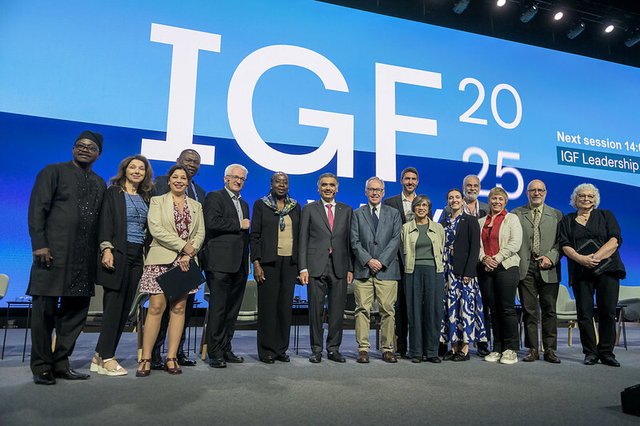
Panelists also discussed ways to enhance the influence of IGF outputs, suggesting that some conclusions and key takeaways be integrated into global and national governance processes with a clearer format and focused engagement. Another recommendation was to better synchronise the IGF with the calendars of global forums and discussions, particularly those related to the UN General Assembly.
Furthermore, the panel addressed the need to incentivise participation from all stakeholder groups and ensure that the IGF evolves to meet emerging global challenges. Notably, Nobel Peace Prize winner Maria Ressa highlighted the wide participation from African and Asian countries at this edition of the IGF - noting the attendance of 16 ministers from the Global South in high-level sessions - something the forum should strive to achieve in the future.
Global perspectives on “network fees” and net neutrality digital trust
The session brought together a diverse panel of academics, civil society voices, regulators, and industry representatives to examine the recurring push by telecom operators to introduce network usage fees.
The session shed light on the significant implications of “network fee” proposals which would require by laws that large digital content providers contribute to the network infrastructure costs - in addition to their contribution of subsea cables and content delivery networks.
While recent proposals for network fees claim to address the burden placed on local networks by large content providers, Professor Kyung Sin Park noted that they overlook the Internet’s mutually beneficial structure. Content providers invest heavily in overseas infrastructure, just as telcos build and maintain local networks. The Internet thrives precisely because of this balance, reinforced by decades of settlement-free peering agreements. Introducing mandatory payments would break this model, incentivising fragmentation and commercial gatekeeping, rather than cooperation and openness.
The panel highlighted that Internet traffic growth has been manageable and the current system of collaborative, voluntary peering where both telecoms and content providers benefit has enabled innovation and connectivity, globally. As Netflix’s Thomas Volmer said, the Internet is not “breaking” - it continues to evolve thanks to shared investment and coordination between infrastructure and content providers.
Bridging silos in global digital cooperation
How do we bridge the gap between the technical community and other stakeholder groups? The session addressed an apparent gap between the technical and policy communities in global digital governance, and how this disconnect can hamper meaningful cooperation.
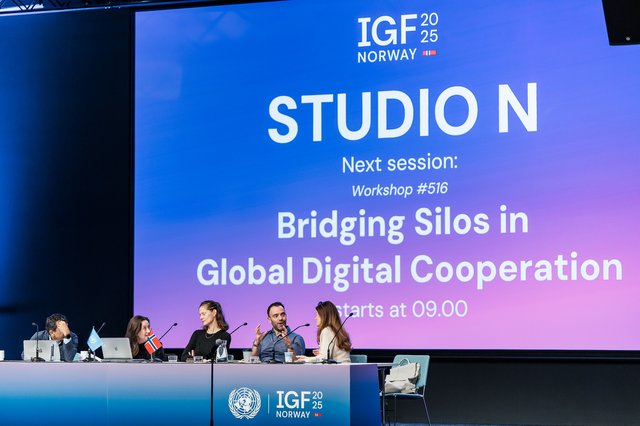
Konstantinos Komaitis observed that while the early Internet was built on a shared vision of global connectivity, he felt that today's collaboration often feels ‘forced and calculated’ due to diverging goals, particularly from some governments that no longer align on core principles like openness and access. He warned that without a renewed common purpose, there could be a growing fragmentation in conversations that could risk fragmentation in the Internet itself.
Madeline Carr echoed this and said that the technical community can lack diplomacy that makes it difficult but on the other hand, the policy community has a lack of understanding when it comes to the technical layer of the Internet. Both groups can get frustrated, she said - the technical community feels their advice is ignored while the diplomatic community feel that they're receiving unusable advice.
She also highlighted that there was a problem with the educational system: diplomats don't learn anything about technology that they are ultimately asked to regulate. "If you want to kill [the Internet], it will die through a thousand cuts." Governments must continue efforts to understand the technology so they can protect it and not accidentally destroy it.
Promoting responsible Internet practices in infrastructure
This session explored how infrastructure providers, from DNS operators to hosting services, can promote responsible Internet practices amid legal and operational challenges. Jacqueline van de Werken (O.Com) noted that hosting providers often apply the strictest global standards to navigate inconsistent regulations like the DMCA and Europe’s E-Commerce Directive, with trust becoming a key commercial asset.
Irina from .RU highlighted the growing expectation for DNS operators to act on abuse reports, despite lacking investigative expertise. Mistaken suspensions of legitimate domains raise accountability concerns. The panel also underscored barriers such as high compliance costs and regulatory fragmentation. Julija Kalpokine (Internet & Jurisdiction Project) and others stressed the need for better coordination and support, especially for overlooked but essential open-source infrastructure.
Day 2 - Wednesday, 25 June
Discussions on Day 2 dove deeper into the multistakeholder approach in different dimensions of Internet governance. One intersessional work session looked at the effectiveness of dynamic coalitions. Panellists discussed the value of these coalitions as “living labs” that bring in diverse stakeholders through meaningful inclusion.
One workshop went over revamping current decision-making in digital governance, raising questions about how to improve cooperation in these processes. Some solutions were pointed to, like the Global Digital Compact and the NETMundial+10 São Paulo Multistakeholder Guidelines.
The ongoing WSIS+20 review was also a major topic, with several workshops covering different efforts related to the process, such as an Open Forum reviewing how WSIS+20 can help achieve the UN’s Sustainable Development Goals and another Open Forum on how to effectively incorporate all stakeholders.
A workshop on Internet resilience and securing a stronger supply chain raised the importance of increasing redundancy. As Ram Mohan, Chief Strategy Officer of Identity Digital noted, resilience is not about preventing outages, but being able to mitigate them, such as by routing traffic around failures. Vint Cerf also spoke, highlighting the importance of security and the need for trust in the Internet, which has now become critical infrastructure.
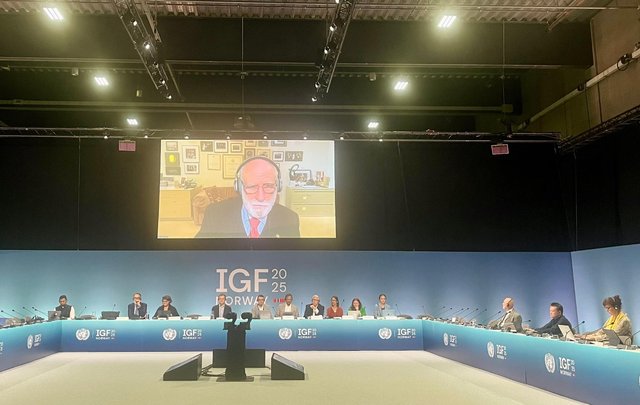
As we all struggle with questions around how AI will impact our work in the coming years, all positions, benefits, risks and downsides were on show during several workshops and sessions, including a panel discussion involving the European Commission, the US, Lesotho and Norwegian governments, OpenAI, Meta, and actor Joseph-Gordon Levitt. The many advantages of using AI in all its forms were highlighted, while the main concerns centred around ensuring equitable access as well as ensuring that the human work that powers AI is rewarded. Providing regulation that gives appropriate guardrails to protect workers versus restricting innovation around AI is the crux of this issue at this IGF. One reflection that resonated is that discussions around AI are often quite similar to the discussions that took place at the IGF 20 years ago as the Internet itself became the new technology that would change the future of how we work.
There were also discussions bringing together the common themes of AI and multistakeholderism. One session considered how to protect human rights in the age of AI. Ernst Noorman, Ambassador for Cyber affairs for the Kingdom of the Netherlands, drew attention to the Freedom Online Coalition’s 2025 Joint Statement on AI and Human Rights, which calls for AI policy to be based on human rights laws and multistakeholder processes. As Ernst stated to attendees, “Human rights must not be an afterthought in AI governance. They must be the foundation.”
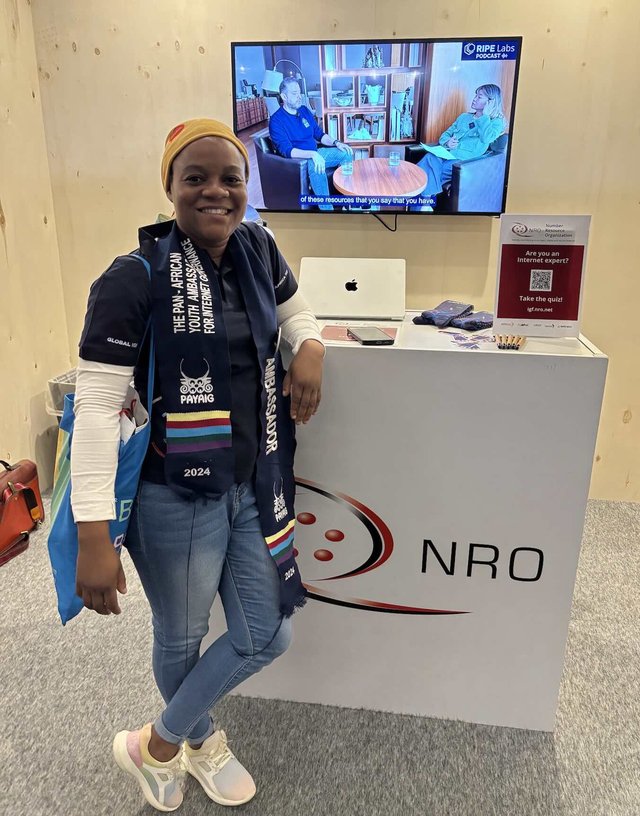
Day 1 - Tuesday, 24 June
Opening ceremony
The opening ceremony saw a lot of reflections on the main theme - there was a clear message that building digital governance together was mission critical and a continued effort. UN Under-Secretary-General Li Junhua and Norway’s Minister Karianne Tung both echoed that digital cooperation was no longer a bold aspiration as it was 20 years’ ago, but essential.
Speakers from the technical, civil society, and policy communities - including Kurtis Lindqvist (ICANN), Doreen Bogdan-Martin (ITU), and Tawfik Jelassi (UNESCO) all echoed the importance of coordination over control. Tawfik warned that when digital transformation was done right, it was like a caterpillar turning into a butterfly; but when done wrong, all you’d have is really a fast caterpillar. He said we can’t afford to settle for speed without substance where technology does not just move faster, but moves better towards equity, sustainability, and universal rights.
Actor and tech advocate Joseph Gordon-Levitt spoke on AI - something very much in the limelight at this IGF - and he warned against leaving AI development to market forces alone, advocating for strong governance. He also advocated for digital self-ownership when it comes to the data humans produce and AI uses.
Norway’s Prime Minister, Jonas Gahr Støre, added that the Internet must remain a public good: open, inclusive, and safeguarded through collective action.
NRI collaborative session sustainable models for community-based connectivity
The NRI session on sustainable models for community-based connectivity reinforced the vital role that bottom-up, community-driven approaches play in expanding Internet access. It was very much argued that governments can’t close the connectivity gap and it was up to organisations - such as the RIPE NCC - to step in. Policies must be shaped in collaboration with communities, reflecting their needs and realities, not just top-down mandates. Alternative models were also tabled, like decentralised networking infrastructure powered by solar energy and low-earth orbit satellites, requiring supportive regulation, simplified licensing, and reduced fees.
The RIPE NCC’s and RIPE community involvement in NRIs and Network Operator Groups (NOGs) was very much needed for building capacity and enabling sustainable, community-led infrastructure. By offering training, technical resources, and direct engagement with communities on the ground, local communities could develop their own, sustainable networks.
High-level session on digital public goods and global digital cooperation
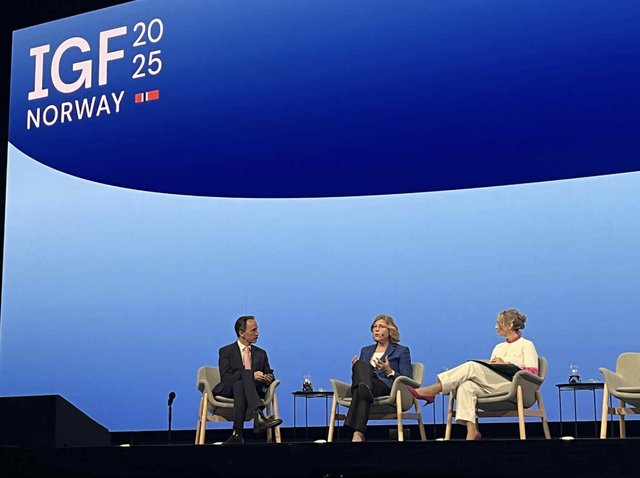
The RIPE NCC attended a plenary session which featured a keynote speech by Henna Virkkunen, the Executive Vice-President of the European Commission for Technological Sovereignty, Security, and Democracy. She emphasised the urgent need to promote global digital cooperation and referred to the EU's International Digital Policy Strategy, recently released just a couple of weeks ago. This strategy reaffirms the principles of the multistakeholder model and outlines the EU’s approach to building partnerships and cooperating in digital governance.
Following her speech, Virkkunen engaged in a dialogue with Karianne Tung, Norway's Minister of Digitalisation and Public Governance. Both leaders underscored the importance of open innovation, open standards, and open-source solutions in developing digital technologies that align with the strategic autonomy and sovereignty goals pursued by many governments. The concept of Digital Public Goods was also discussed and described as a growing area of interest for public investments.
Demystifying WSIS+20
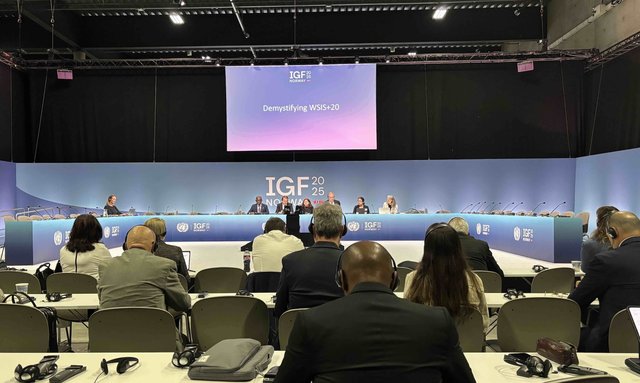
With the WSIS+20 review fast approaching in December, this session focused on how all stakeholders including governments, civil society and the technical community can meaningfully engage in the process. There was a strong call for preserving and strengthening the multistakeholder model, which has been central to WSIS’s success over the past 20 years.
Kurtis Lindqvist, President and CEO of ICANN, delivered a clear call to action for the technical community: come prepared with evidence of what has worked. He stressed that bringing tangible examples to the table was really important. Kurt’s final comment was that we don’t need new structures, we need a commitment to the models that have been delivering for decades and have proven their value in making the Internet work.
Fireside chat with Joseph Gordon-Levitt
While the actor Joseph Gordon-Levitt was primarily invited to speak about the impact of AI on the creative industry and Hollywood in particular, he talked more broadly about how he perceived big tech companies using the data and knowledge produced by all of us to feed their AI models, and how they make money from this without compensating those who actually contribute the knowledge and data to their products. He said that we need more rules and laws for BigTech, also to protect us and our children from the addictive algorithms used on their platforms, similar to laws that allow the use of other addictive products such as gambling only after a certain age. It was a very engaging and inspiring session.
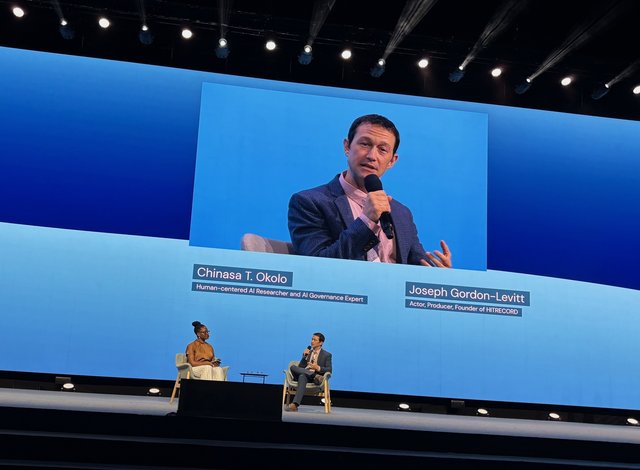
IGF 2025 networking session #138 Tech & Policy: Building bridges in Internet Governance
The Internet Engineering Task Force (IETF) organised a panel session to bridge the technical and the policy world. It was interesting to hear how much people from civil society and governments are actually involved in the IETF, and particularly in some of the research groups that touch upon policy and societal issues such as human rights and access for all. The policymakers programme that is organise alongside each IETF meeting was mentioned and a number of government representatives in the audience had participated in this programme and encouraged others to do the same. It was also highlighted how important the participation of technical organisations is in the IGF and that in fact technical organisations are the second biggest financial contributors to the IGF, after governments but before the private sector.
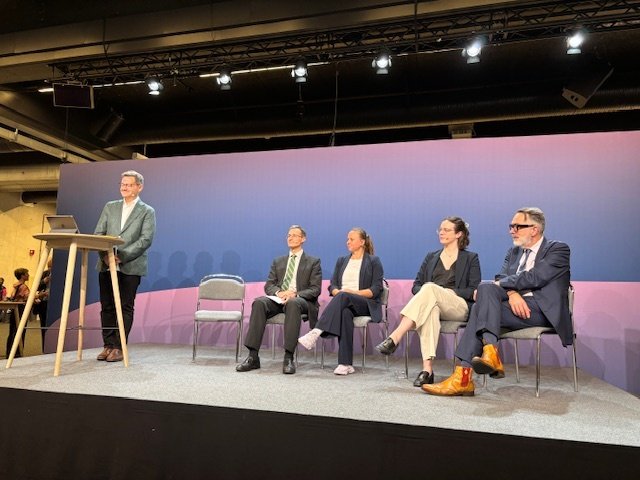
IGF 2025 Launch / Award Event #96 Empower the Global Internet Standards Testing Community
Our own Alena Muravska shared her views in an event on empowering the global Internet standards testing community. As she stated, "there are two core principles on which the global Internet is built. The registration of Internet identifiers I just mentioned is one of them….The second core principle is protocol standardisation. It is the development and adoption of open standards that define how devices communicate over the Internet. Together, registration and standardisation have enabled the Internet to function as a global, permissionless platform for innovation.” She noted that “While governments play a key role in promoting and supporting these standards, their efforts must complement, not replace, the open, collaborative processes that have ensured the Internet remains interoperable, innovative, and accessible for the past few decades."
Day 0 - Monday, 23 June
Build digital governance together
Day 0 got under way with an opening session by the host country Norway. Norway is quite unique in that it has achieved 100% Internet access
RIPE NCC Managing Director and CEO, Hans Petter Holen was on the big stage along with panellists Carol Roach (IGF MAG Chair), Thomas Schneider (Swiss Cyber Ambassador), and Elise Lindberg (CEO, Skygard). The panel discussion set the tone for many of the sessions that will follow across the week - how can we build digital governance together and what can a multistakeholder forum like the IGF contribute to this?
As put by Karianne Tung (Minister of Digitalisation and Public Governance, Norway): “A balanced multistakeholder model doesn’t happen by accident; it must be cultivated through sustained effort.”
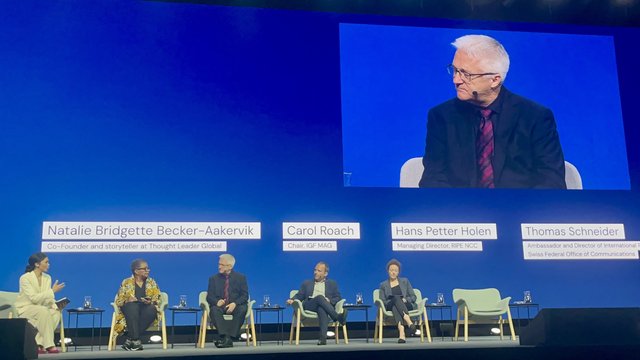
The ‘I’ in IGF stands for ‘Internet’
Every IGF sees a slew of sessions on the latest trend and unsurprisingly, AI is in the limelight this year. And amid the AI hype, there is a renewed focus on the foundational layer on top of which all these services run - the infrastructure and resilience of the Internet itself.
The resilience of the Internet is the other big theme that we are likely to see cropping up over the week here. Day 0 saw three sessions dedicated to this - two on subsea cables and one organised by the RIPE NCC.
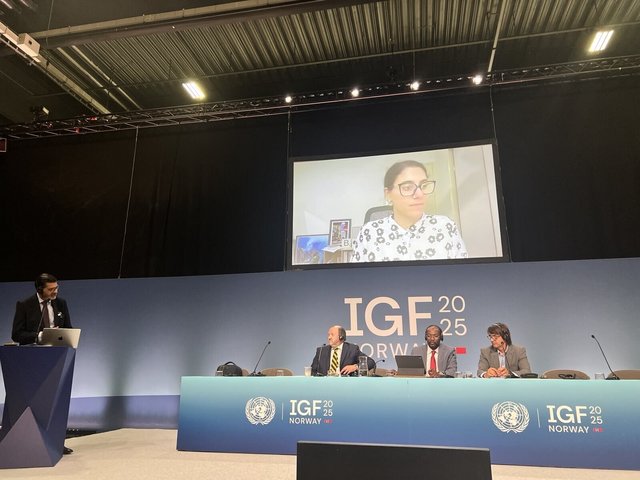
As we see the development of AI, the growth in IoT devices and an uptake in digital governance initiatives, it is all the more essential that the foundations of the Internet remain robust. We heard from representatives of the Norwegian and Croatian regulators, ICANN, Smart Africa and the NRO, highlighting different aspects of Internet resilience.
In some ways, the discussions around subsea cables feel like a continuation of the discussion held during the Cooperation Working Group session at RIPE 90 earlier this year. There were two sessions on the first day alone addressing issues of infrastructural security - a plenary session on the protection of subsea cables and a workshop on securing basic Internet infrastructure.
A key takeaway from both sessions was that although the Internet is capable of routing around damage during an outage, this should not be taken for granted. Preparation and coordination across groups is essential to ensure Internet resilience during a crisis.
The Day 0 session was concluded by a midsummer reception in the striking Oslo City Hall. As more than one speaker emphasised - the future of the Internet can only be shaped by all of us together.


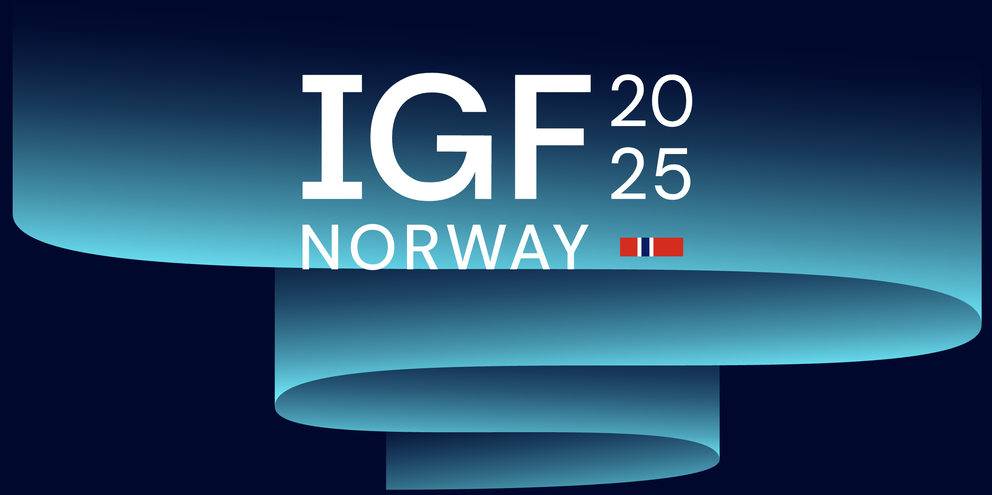
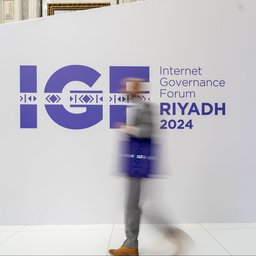
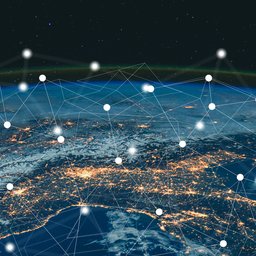

Comments 0